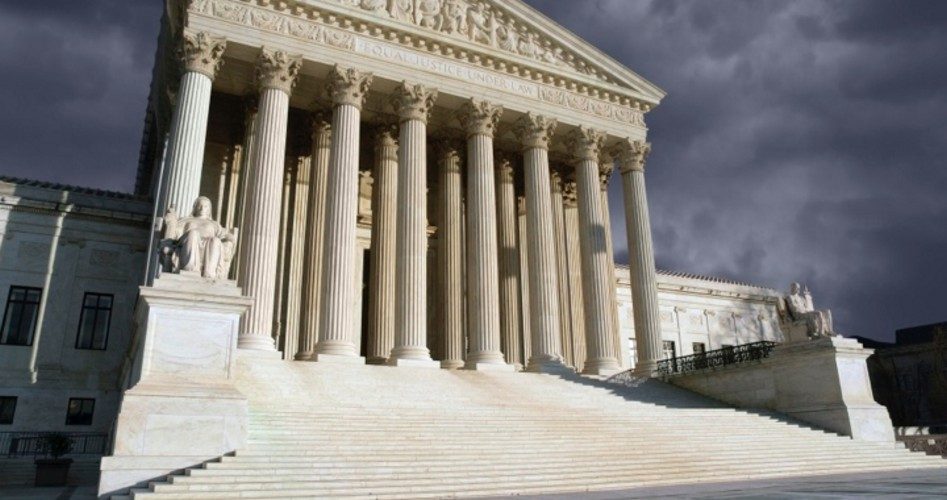
On Tuesday, the U.S. Supreme Court agreed to hear a legal challenge by 26 states against President Obama’s immigration executive actions seeking to grant legal status and work permits to millions of illegal immigrants, Politico reports.
The case focuses on executive actions that resulted in the implementation of the Deferred Action for Parents of Americans and Lawful Permanent Residents (DAPA), which targets 4.3 million undocumented immigrants who are parents of U.S. citizens or lawful permanent residents, and the expansion of the 2012 Deferred Action for Childhood Arrivals (DACA), which targets teenagers and young adults who were born outside the United States but raised here.
The 26-state lawsuit raises three specific objections to the president’s actions: Obama is violating the Constitution’s “Take Care Clause,” which states that the president “shall take care that the laws are faithfully executed”; the executive branch is acting in violation of rulemaking procedures; and the executive order will “exacerbate the humanitarian crisis along the southern border.”
The White House claims that the executive actions fall well within the powers of the president (the executive branch), in spite of the fact that under the U.S. Constitution, only Congress (the legislative branch) is to make laws. A White House offiial told Fox News,
The Supreme Court and Congress have made clear that federal officials can set priorities in enforcing our immigration laws, and we are confident that the President’s executive actions are well within his legal authorities.
Thus far, however, the Obama administration has found it difficult to prove its case. In November, a three-judge panel from the U.S. Court of Appeals for the Fifth Circuit upheld an injunction granted by U.S. District Judge Andrew Hanen on February 16 that blocked Obama’s executive actions.
Judge Hanen determined that there was sufficient merit to the states’ challenge to warrant a suspension while the case goes forward. In his memorandum opinion, he wrote that no such law exists that grants the administration the power “to give 4.3 million removable aliens what the Department of Homeland Security itself labels as ‘legal presence.’”
“In fact the law mandates that these illegally-present individuals be removed,” he added.
The Fifth Circuit agreed with Hanen’s determination that the states “have standing.”
According to Politico, the Obama administration had the opportunity to take the issue to the Supreme Court in May when the Fifth Circuit refused to stay Judge Hanen’s order, but decided instead to await the outcome of the appeal. The Fifth Circuit had promised to expedite its ruling, but the decision took longer than expected.
Immediately following the decision by the Fifth Circuit, the Justice Department petitioned the high court to take up the case to determine whether states have legal standing to challenge the president’s executive actions, whether Obama’s actions are arbitrary under federal law, and whether the administration must go through a formal notice-and-comment period before forging ahead with its unilateral immigration plan.
In their order on Tuesday, the Supreme Court justices added one additional question to the case regarding whether President Obama’s actions violated the constitutional provision that requires the president to “take care that the Laws be faithfully executed.”
Experts are debating whether the question added by the justices signals that they disagree with the DOJ’s claims that the states do not have legal standing, or if the question was added in order to ensure that all legal issues are addressed.
The Huffington Post addresses the potential ramifications of the move by the justices:
This unprompted move by the justices turns the case into a potential constitutional showdown — alongside others the court has heard or will hear on hot-button issues such as abortion, affirmative action, voting rights and the fate of public-sector unions.
Texas Attorney General Ken Paxton, who has been leading the case against the Obama administration, stated,
In deciding to hear this case, the Supreme Court recognizes the importance of the separation of powers. As federal courts have already ruled three times, there are limits to the President’s authority, and those limits enacted by Congress were exceeded when the President unilaterally sought to grant “lawful presence” to more than 4 million unauthorized aliens who are in this country unlawfully. The Court should affirm what President Obama said himself on more than 20 occasions: that he cannot unilaterally rewrite congressional laws and circumvent the people’s representatives.
The Obama administration remains optimistic that the court will rule in its favor. White House Press Secretary Josh Earnest told reporters,
We’ve got a lot of confidence in the legal arguments that we’ll be making before the court. The kinds of executive actions that the president took a little over a year ago now to try to bring some much-needed reform in greater accountability to our broken immigration system were clearly consistent with the precedent as established by other presidents and clearly within the confines of his authority as president of the United States. These kinds of enforcement decisions were also made by President Reagan and President George W. Bush.
Of course, if one president exceeds his constitutional authority, that does not mean that another president may then do the same thing without also violating the Constitution. The Constitution clearly states, “All legislative Powers herein granted shall be vested in a Congress of the United States, which shall consist of a Senate and House of Representatives.” This means that the president has zero authority to legislate.



